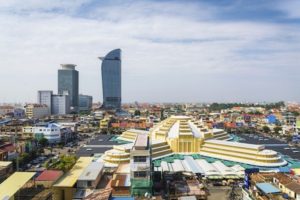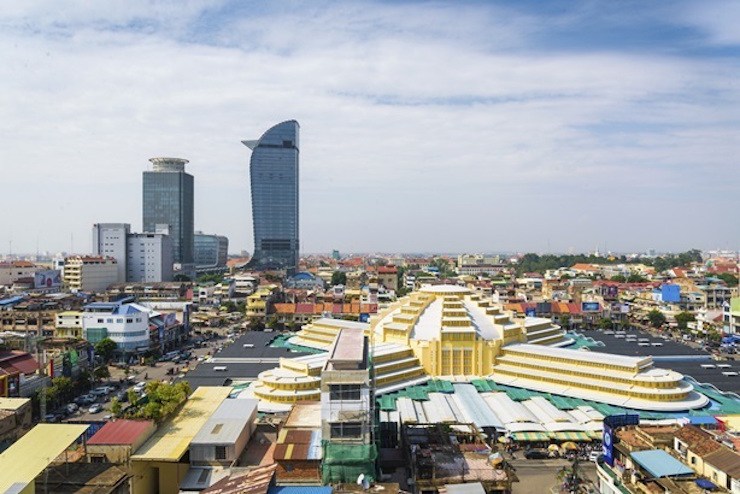 Solid economic growth and strong foreign investor demand are helping to drive Cambodia’s condo boom, but some worry it could lead to a glut
Solid economic growth and strong foreign investor demand are helping to drive Cambodia’s condo boom, but some worry it could lead to a glut
Cambodia’s real estate market is heating up, especially in its capital Phnom Penh, with foreign developers from China, Singapore, Taiwan and Korea looking to expand their footprint in the fast-growing city.
For Singaporean developers, restrictive cooling measures in the city-state, as well as the passing of legislation some years back allowing foreigners to own Cambodian property, have been the main pull factors for companies such as Oxley Holdings, Teho International and TA Corporation to develop large-scale commercial and residential projects in Phnom Penh.
Under the Foreign Ownership Property Law, foreigners can own upper-floor units, but not ground floor units, and up to 70 percent of a condominium project.
According to property consultancy CBRE, this restriction has little impact on foreign buyers, considering that apartments are usually not built on the ground floor.
Outperforming the neighbours
In its inaugural “Cambodia Real Estate Highlights” report, Knight Frank said it expects the country’s economy to grow at an average of seven percent year-on-year until 2018, outperforming other economies in the region. Much of the growth will come from the manufacturing, agriculture, tourism and construction sectors, with the latter helping to boost the fledgling property market.
Today the city of Phnom Penh is a hive of building activity, “dotted with mid- to high-rise projects under construction,” says Sofia Perez, research and consultancy manager at Knight Frank Cambodia.
She notes that “11 condominium developments were launched in H2 2015, which will add 1,768 units to the existing stock”, in contrast to the 2009 and 2010 period, when only 732 condo units were put up for sale.
Over the next four years, Knight Frank expects the supply of new residential apartments in the city to surge by a whopping 641 percent. Meanwhile, CBRE believes that Cambodia’s condominium market offers great potential, and expects more than 9,000 units to enter the market between 2015 and 2018.
However, with thousands of units expected to be ready in the next few years, some analysts are warning of a possible oversupply.
“There are growing concerns about a potential oversupply in the near future, with many anticipating supply to quickly outpace demand. This can be attributed mainly to limited local market demand coming from high-net-worth individuals and expatriates living in Cambodia, which has forced many developers to target the overseas market,” said Perez.
“Taiwanese, Chinese, Singaporeans, Japanese and Malaysians are some of the main overseas investors buying the majority of the residential units.”
In addition, Knight Frank revealed that many developers are looking to increase sales by offering incentives such as upfront discounts, furniture packages and guaranteed rental returns.
Condo prices up; still much cheaper than in Singapore
The recent launches of a few major projects have pushed prices of condo units upwards, noted Perez. But prices are still significantly lower compared to Singapore. For instance, high-end units in central locations are going for more than USD279 per sqft, with some penthouses priced at USD465 per sqft, said the consultancy.
As for rentals, high-end condominiums in the city centre can command anywhere between USD1,345 and USD4,500 per sqft for one- to four-bedroom units, according to figures from the fourth quarter of 2015, added the consultancy.
Meanwhile, property investors have been recording rental returns of between five and seven percent, and capital growth of between five and 7.5 percent per annum.
Foreign property firms move in
As confidence in the property market continues to grow, more real estate agencies are expanding into Cambodia to support marketing efforts. US-based Century 21 opened a representative office in Phnom Penh in 2014, while global firm Savills joined forces with Cambodia’s Keystone Property Consultants last year.
Property developers from Singapore are also recognising Cambodia’s great potential for growth.
“We are of the view that Cambodia’s property market exhibits the right fundamentals for growth: a robust GDP supported by foreign investments, translating into rising demand for office space; and the rising affluence of Cambodia’s young middle class, translating into demand for quality residences,” said TA Corporation’s executive director and CEO Neo Tiam Boon.
The group just launched The Gateway, a mixed-use development located in Phnom Penh’s central business district that comprises 299 strata-titled office units and 572 one- to three-bedroom apartments. It also comes with guaranteed rental returns of 12 percent over two years for the residential units, and 16 percent for the office units.
Currently, about 30 percent of the residential apartments and 40 percent of the office units have been sold or reserved. Aside from Singapore, the project will also be marketed elsewhere in Asia, including Taiwan and China.
Oxley Holdings is also seeing strong interest for its two mixed-use developments in Phnom Penh, The Bridge and The Peak.
So far, almost 100 percent of the residential units and more than 70 percent of the Soho apartments at The Bridge have been sold, said Oxley.
The developer also revealed that phase one of The Peak, comprising 507 residential units in Tower 1, is close to 50 percent sold. The 55-storey freehold project features two residential towers with a total of 1,014 units, a 15-floor office tower and a 300-room hotel, all above a five-storey retail podium.
Property buyers of residential units at The Peak are guaranteed a 12 percent net rental return for two years, subject to conditions.
“We have a good mix of local and foreign buyers for both The Bridge and The Peak. Cambodian buyers contribute close to 50 percent of the total sales. Other than Singaporeans, Taiwanese and Malaysians also form part of the foreigners who buy at these two projects,” a spokesperson for Oxley told PropertyGuru.
Source: http://www.property-report.com/why-phnom-penh-is-asias-next-top-city-for-real-estate/


